Venezuela crisis 2017: Protesters demand political, economic reform
A COUNTRY that was once even richer than Saudi Arabia is nearing total collapse. One protestor — Wonder Woman — is the face of the struggle.
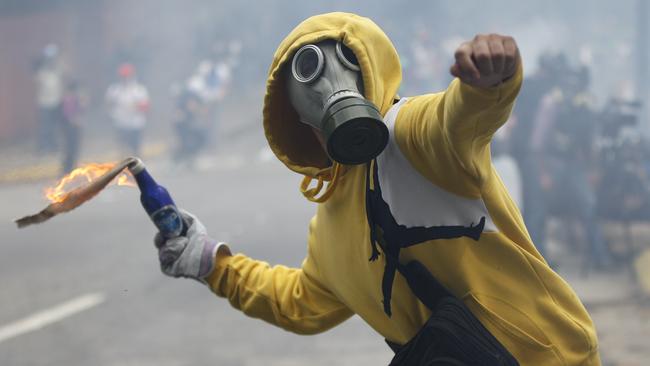
IT IS a country deep in crisis.
Record high inflation, food shortages and deadly protests are gripping Venezuela, once considered South America’s richest nation.
Now it’s on the verge of collapse as its people demand economic reform and an end to the country’s authoritarian rule.
Although the country has more oil underground than Saudi Arabia, it is facing desperate times with people queuing for hours for basic food and provisions.
Citizens are out in force protesting against President Nicolas Maduro’s government which is crushing dissenters while working to maintain its grip on power.
Last week the protests again made international headlines when clashes turned violent and protester Caterina Ciarcelluti — wearing a motorcycle helmet and with the blue, yellow and red Venezuelan flag trailing behind her — was pictured throwing a rock at government forces.
Like many of her countrymen she says it is time for President Nicholas Maduro to step down.
Dubbed the Wonder Woman of Caracas after her photograph went global, she told The Times: “We are tired, they are tired. But there are more of us.”
So for a country so rich in natural resources, how did it go so wrong?
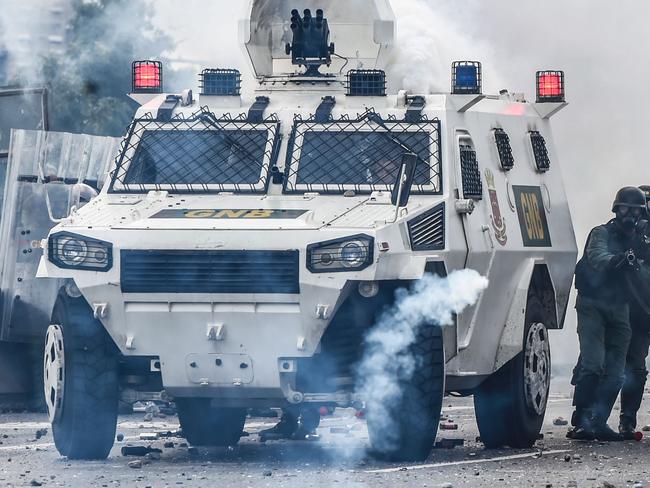
ECONOMIC WOES
Venezuela’s economy is a complete mess, despite its billions annually in oil revenues. The country is not only suffering from a deep recession but also hyperinflation.
Prices across the country skyrocketed 800 per cent last year alone, and the International Monetary Fund predicts it could hit 2200 by the end of the year, according to NBC News.
The economy has shrunk by 18.6 per cent in 2016, and a quarter since Maduro took office.
In a podcast for the New York Times , journalist Nicholas Casey who had been living in Caracas until recently, reveals some people credit the demise of the economy to the moment late President Hugo Chavez won power in 1999.
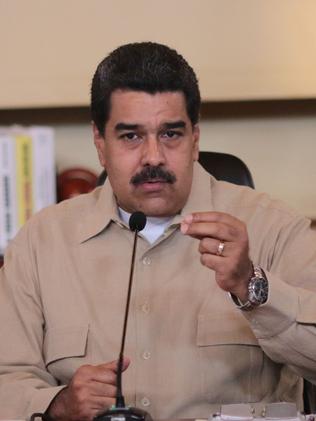
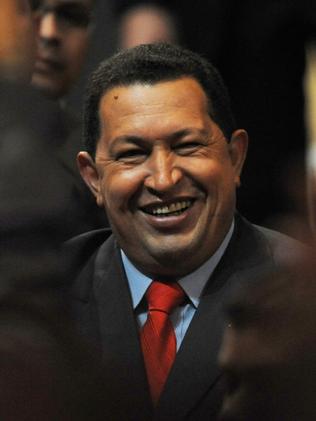
According to Casey, Chavez promised socialism for a new century and was initially seen as the big hope among the left.
After coming to office the price of oil hit around $100 a barrel and Chavez poured money into infrastructure including roads and education.
Chavez even reportedly went around buying fridges and food for people at election time to try and get people to vote for him, representing “democracy, socialism and capitalism at their extremes.”
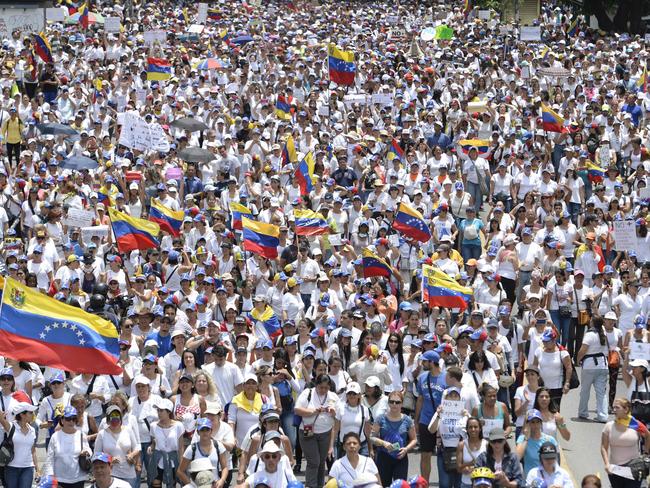
WHAT CHAVEZ GOT WRONG
The man who famously called George W Bush the devil, gave away vast sums of the state’s money which helped his people in the short term.
However, Casey highlights this had negative effects in the long term with money diverted away from the state oil company which “started to kill the goose laying the golden egg.”
The economy fell into free-fall after oil prices collapsed leading to widespread shortages and hyperinflation.
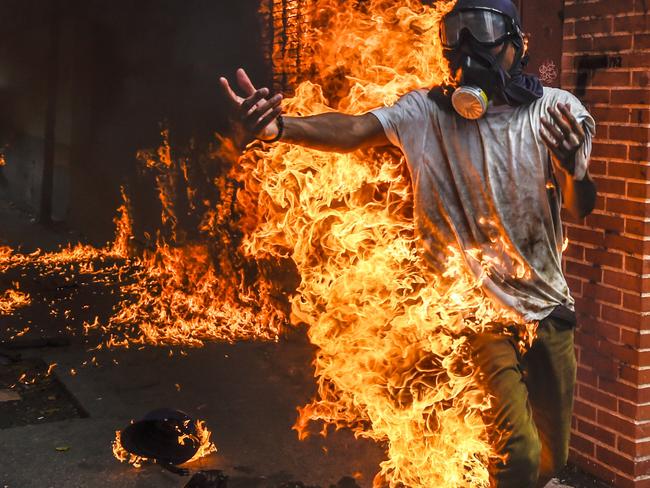
WHY ARE PEOPLE PROTESTING?
Demonstrators blame Maduro for the country’s crisis along with the shortages of food and medicine, with the New York Times reporting hospitals don’t even have clean water or soap for surgeons to wash their hands. Food is scarce, with many people taking to foraging for bush food which might not be safe to eat. Meals that cost a certain amount one week are likely to be many more times expensive a week later. People are struggling to survive.
These harsh conditions — a huge change from Venezuela’s former living standards — have prompted tens of thousands of people to protest. They are demanding elections to remove the leftist president.
Instead of allowing peaceful action, the government has clamped down hard.
At least 37 people have been killed since protests intensified in April after Maduro’s administration and the courts stepped up efforts to undermine the opposition.
Hundreds more have also been injured while thousands of others arrested.
Personal trainer Caterina Ciarcelluti, 44, said although she has been protesting against Leftist governments since the early 2000s, she feels the tide is finally about to turn against an out-of-touch president.
She is pleased her photograph — which went viral partly because of her incredible athletic physique and drew the comparison to Marvel superhero Wonder Woman — has drawn attention to the cause.
But she told Spanish language TV network Univision: “Mentally I am stronger than I look physically.”
“I’ve been protesting since day one, so when they sent me this photo it was a surprise, but I’m glad if it has a positive outcome, so they know about us and also about the women who are leading along with the men,” she said.
“We have no weapons, they have weapons, they have the power.”
She told The Times she had thrown the rock in a moment of rage and did not believe in violence but feared it may be the only way to make the government pay attention.
The fitness regime that has enabled her to endure weeks of sometimes physical protests includes running up the Avila mountain overlooking Caracas at 6am carrying weights followed by another 90 minutes of exercise every day.
“We Venezuelan women are all guerillas. It’s in our personality,” she said, “We tend to look after ourselves physically.”
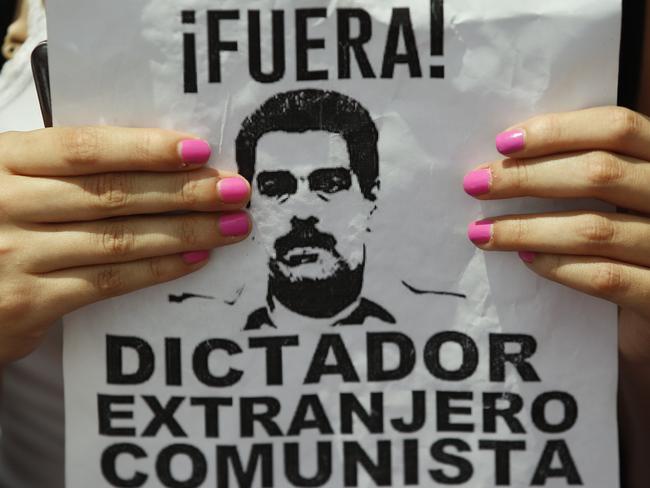
WHO IS NICOLAS MADURO?
Chavez died in 2013 and Nicolas Maduro was his hand-picked successor.
Maduro was elected to victory by a narrow victory and as the country’s oil prices plummeted by more than 50 per cent, NBC News reported.
Many see the dramatic fall in crude oil prices and Maduro’s authoritarian rule as being a big part of the problems gripping the country.
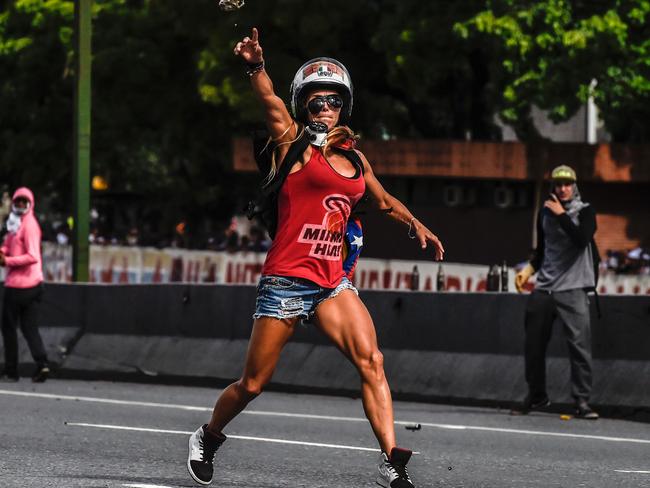
Shannon K O’Neil, a senior fellow for Latin American Studies at Council on Foreign Relations, told NBC Maduro’s decision to pay off the country’s debt rather than help its people was also contributing to the problem.
Maduro has been resisting calls for a vote on removing him from office for months as the country staggers under food shortages, a near-crippled state-run economy and one of the world’s highest inflation rates.
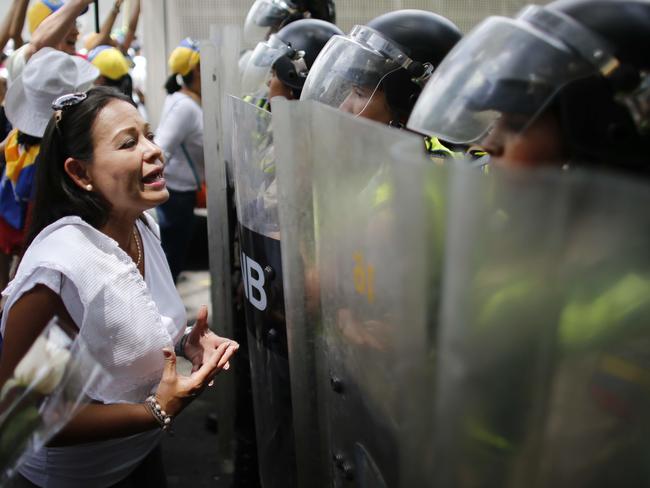
Maduro and his officials say the crisis rocking the country is a US-backed conspiracy designed to topple him and install a right-wing government.
The United States, which had remained relatively quiet over the situation in Venezuela, is now taking a stronger tone against Maduro’s “violent crackdown on protesters.”
The US ambassador to the UN, Nikki Haley, said in a statement that his “disregard for the fundamental rights of his own people has heightened the political and economic crisis in the country.”
She also called for the immediate release of “political prisoners.”
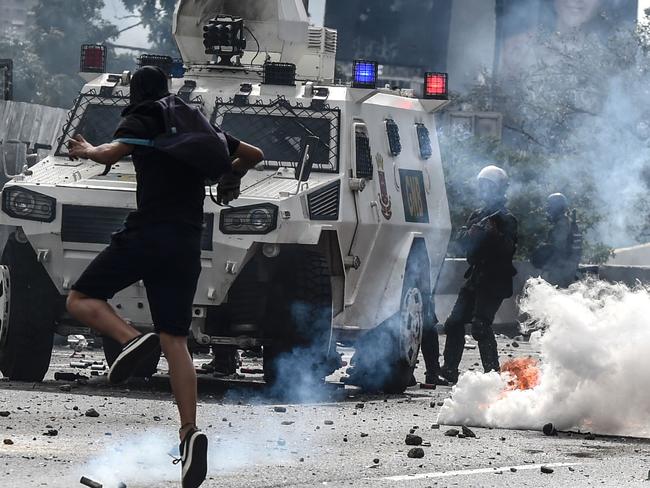
GRIP ON POWER
The President has created a plan for an elected assembly to draw up a new Venezuelan constitution but opposition parties have refused to join the process amid continuing violent anti-Maduro protests.
The centre-right Democratic Unity Roundtable (MUD) formally announced Sunday that it would not participate in Maduro’s plan for a “people’s” assembly calling it a “fraudulent process.”
The plan has drawn widespread international criticism with the US, Mexico, Brazil and Spain all saying any process to modify the constitution requires universal suffrage, while Chile said the process is worsening an already bad political crisis.



